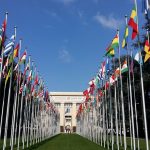By Lisa Sachs, Lise Johnson, Brooke Guven, Jesse Coleman, and Ladan Mehranvar
May 4, 2021
This week is one that is make or break for the United Nations Commission on International Trade Law (UNCITRAL) Working Group III’s efforts to reform investor-state dispute settlement (ISDS). WGIII is discussing a draft work plan that identifies reform solutions the WGIII will advance, plots time allotted to each, and outlines the mode and pace of discussion. Will this plan enable the WGIII achieve its ISDS reform objectives?

By Solina Kennedy, Martin Dietrich Brauch, Perrine Toledano, and Tehtena Mebratu-Tsegaye
January 14, 2021
With Nigeria’s National Assembly debating the proposed Petroleum Industry Bill (PIB) in the first quarter of 2021––after nearly two decades of attempted reform of the country’s petroleum sector––Nigeria has a unique opportunity to rethink the role of the oil and gas industry in Nigeria’s economy and build out the country’s energy sector and economic capacity for the long term.

By Sam Szoke-Burke
September 18, 2020
Since last year, 35,000 people in Uganda’s Kiryandongo district were forced from their lands to make way for large-scale farming, including at gunpoint and by a sugar firm with international backing. Community members continue to be intimidated and tortured during a COVID-19 lockdown. The sugar industry is clearly still a long way from achieving sustainable and human rights-compliant sugar production.

June 15, 2020
In this profile, Mateusz Ciasnocha, Incubation Manager at AgriTech Hub VC, and a 2019 Executive Training alumnus, addresses his personal trajectory and what factors allowed him to get to where he is today, providing key advice to those interested in pursuing similar goals.

By Heather Marquette
February 12, 2020

By Lise Johnson
January 14, 2020
The issue of investor responsibilities in investment law is – and should be — gaining prominence. Questions regarding whether and how investor responsibilities are, could, and should, be incorporated into or otherwise interact with international investment law and international investment agreements (IIAs) are a crucial part of the conversation regarding international investment law and policy, and reform thereof.

By Jesse Coleman
January 14, 2020
Can the investment regime be used to enhanced access to remedy and corporate accountability for human rights abuses in the context of international investment? If so, how?

By Brooke Skartvedt Güven
January 3, 2020
Investor-state mediation is a mechanism that is increasingly considered as a way to resolve disputes between companies and their host-country governments. Mediation merits exploration precisely because it can be adapted by the parties to the circumstances of any particular investment-related issue and be used to support mutually-beneficial outcomes. In this way, its malleability should be viewed as a tool that, if properly used, could overcome the failures of the investor-state dispute settlement (ISDS) system evidenced by the current “legitimacy crisis” that ISDS faces. However, to the extent mediation’s flexibilities are used to facilitate processes or outcomes that sideline domestic legal processes, third-party rights and interests, and norms of democratic accountability and the rule of law, it will undoubtedly meet the same fate as ISDS.

In this profile, Bénéwindé Rouamba, Head of Project for Land for Life at Welthungerhilfe, and a 2019 Executive Training alumnus, addresses rural land governance policy reforms and sustainable agricultural investment to protect the food security and livelihoods of vulnerable groups in Burkina Faso, Ethiopia, Liberia, and Sierra Leone.
November 2019
Actors working on supporting progress on the governance of extractive industries (GEI field) have long understood the importance of political context in determining outcomes from EI and from interventions designed to improve these. Much less clear has been how to systematically integrate political concerns – related to power, interests/incentives and political systems – into this work.











